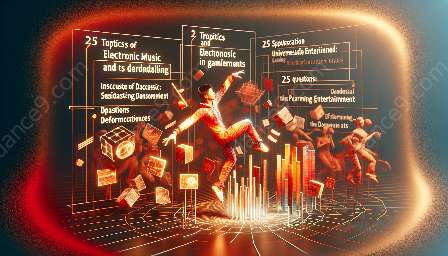Remixing and sampling have become integral parts of the dance and electronic music genres. These processes have unique psychological effects on listeners, affecting their emotional responses, cognitive processing, and overall enjoyment of the music.
The Nature of Remixing and Sampling in Dance & Electronic Music
In the realm of dance and electronic music, remixing involves reimagining and reinventing existing tracks. It often involves altering the tempo, adding new elements, and incorporating creative edits to produce a new version of the original song. Sampling, on the other hand, entails taking snippets or segments of sound from various sources and integrating them into a new composition, providing a novel sonic experience.
Exploring the Psychological Impact
Emotional Response: Remixing and sampling can evoke diverse emotional responses in listeners. The familiarity of sampled elements may invoke nostalgia or sentimentality, while remixes that change the mood or tempo of a song can induce excitement, surprise, or even a sense of unpredictability.
Cognitive Processing: When exposed to remixes and samples, listeners engage in cognitive processing that involves recalling the original song and comparing it to the new version. This mental activity often leads to heightened attention and cognitive stimulation, as listeners analyze the changes and reinterpretations made in the remix or sample.
Enhanced Musical Experience: Remixing and sampling contribute to an enhanced music listening experience. By presenting familiar elements in a new context, these techniques offer listeners a fresh perspective on the original song, leading to a sense of novelty and excitement.
The Relationship Between Remixing, Sampling, and Listener Engagement
Remixing and sampling play key roles in engaging listeners within the dance and electronic music scene. The element of surprise and anticipation surrounding remixes and samples often leads to an increase in listener engagement. Additionally, the interactive nature of remix culture encourages active participation from the audience, promoting a sense of community and shared experiences.
Implications for Artists and Producers
Understanding the psychological effects of remixing and sampling on listeners can be valuable for artists and producers within the dance and electronic music genres. By recognizing the emotional and cognitive impact of these techniques, creators can strategically utilize remixes and samples to elicit specific responses from their audience, ultimately enhancing the overall reception of their music.
Conclusion
Remixing and sampling in dance and electronic music have significant psychological effects on listeners, influencing their emotions, cognitive processing, and overall musical experience. These techniques contribute to the dynamic and interactive nature of these genres, fostering a deeper connection between artists, producers, and their audience.






























